Brexit and Parliamentary Sovereignty: UK's Journey to Restore its Independence
VerifiedAdded on 2023/06/10
|8
|1673
|202
AI Summary
This article discusses the journey of UK to restore its independence after Brexit and how parliamentary sovereignty played a crucial role in it. It also explores the complexities in the post-Brexit relationship between UK and EU.
Contribute Materials
Your contribution can guide someone’s learning journey. Share your
documents today.
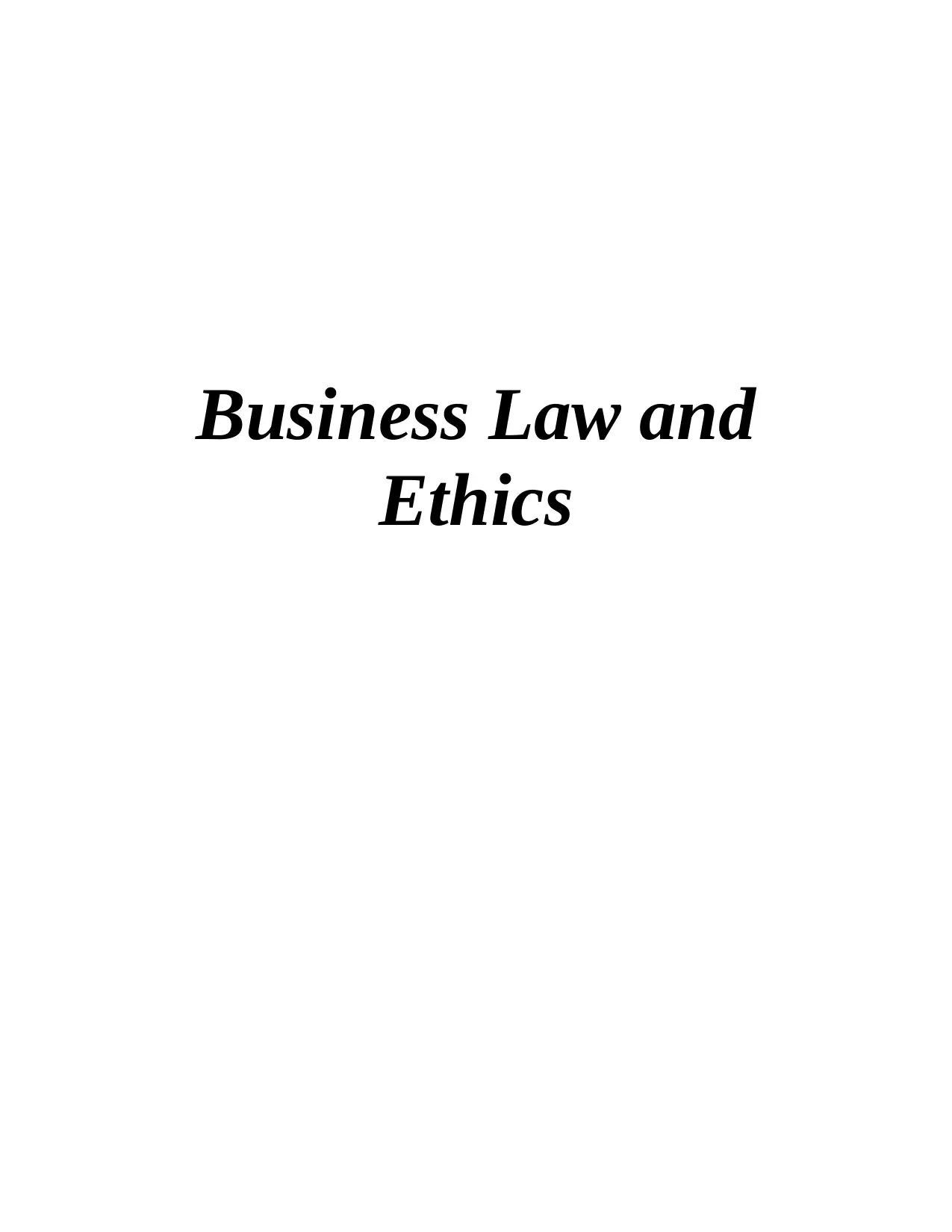
Business Law and
Ethics
Ethics
Secure Best Marks with AI Grader
Need help grading? Try our AI Grader for instant feedback on your assignments.
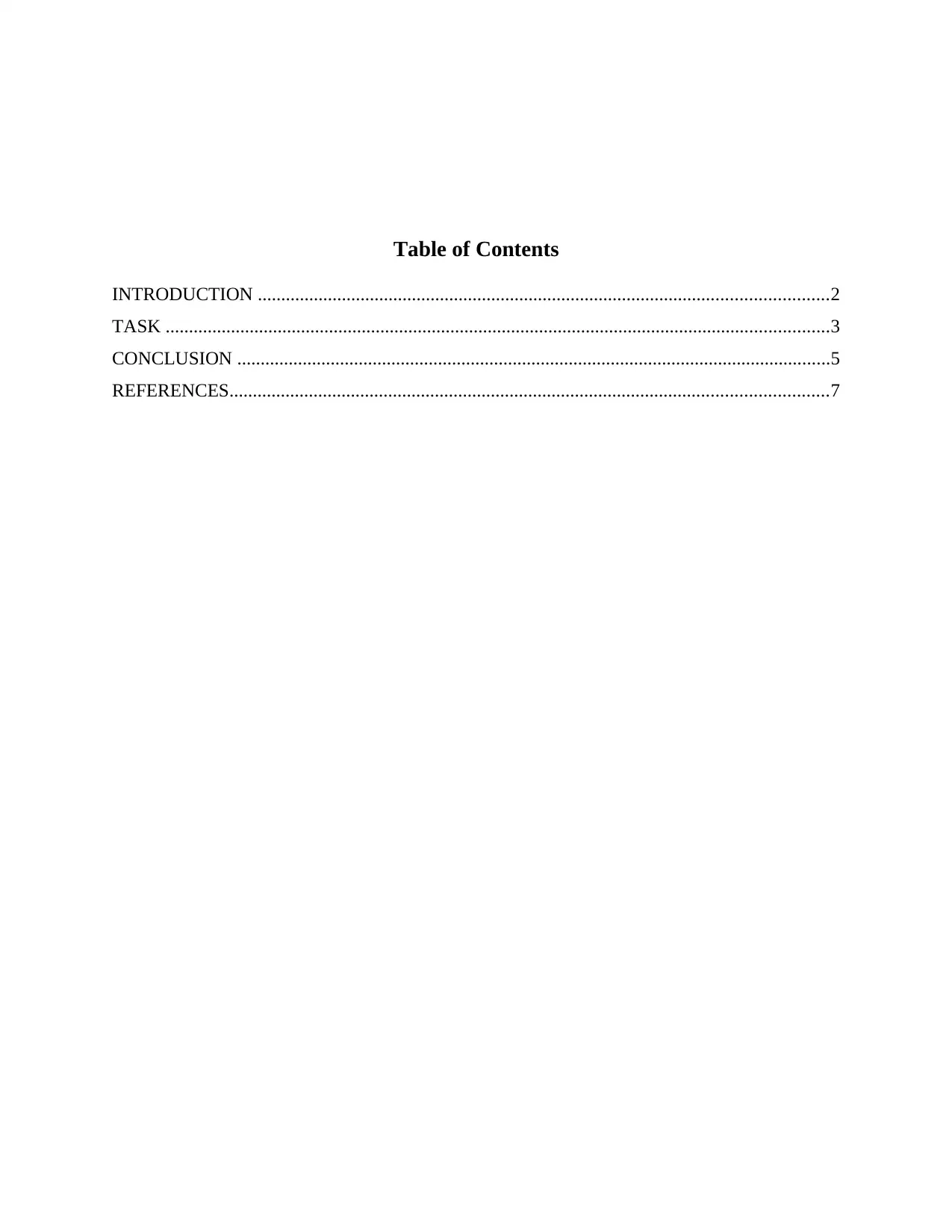
Table of Contents
INTRODUCTION ..........................................................................................................................2
TASK ..............................................................................................................................................3
CONCLUSION ...............................................................................................................................5
REFERENCES................................................................................................................................7
INTRODUCTION ..........................................................................................................................2
TASK ..............................................................................................................................................3
CONCLUSION ...............................................................................................................................5
REFERENCES................................................................................................................................7
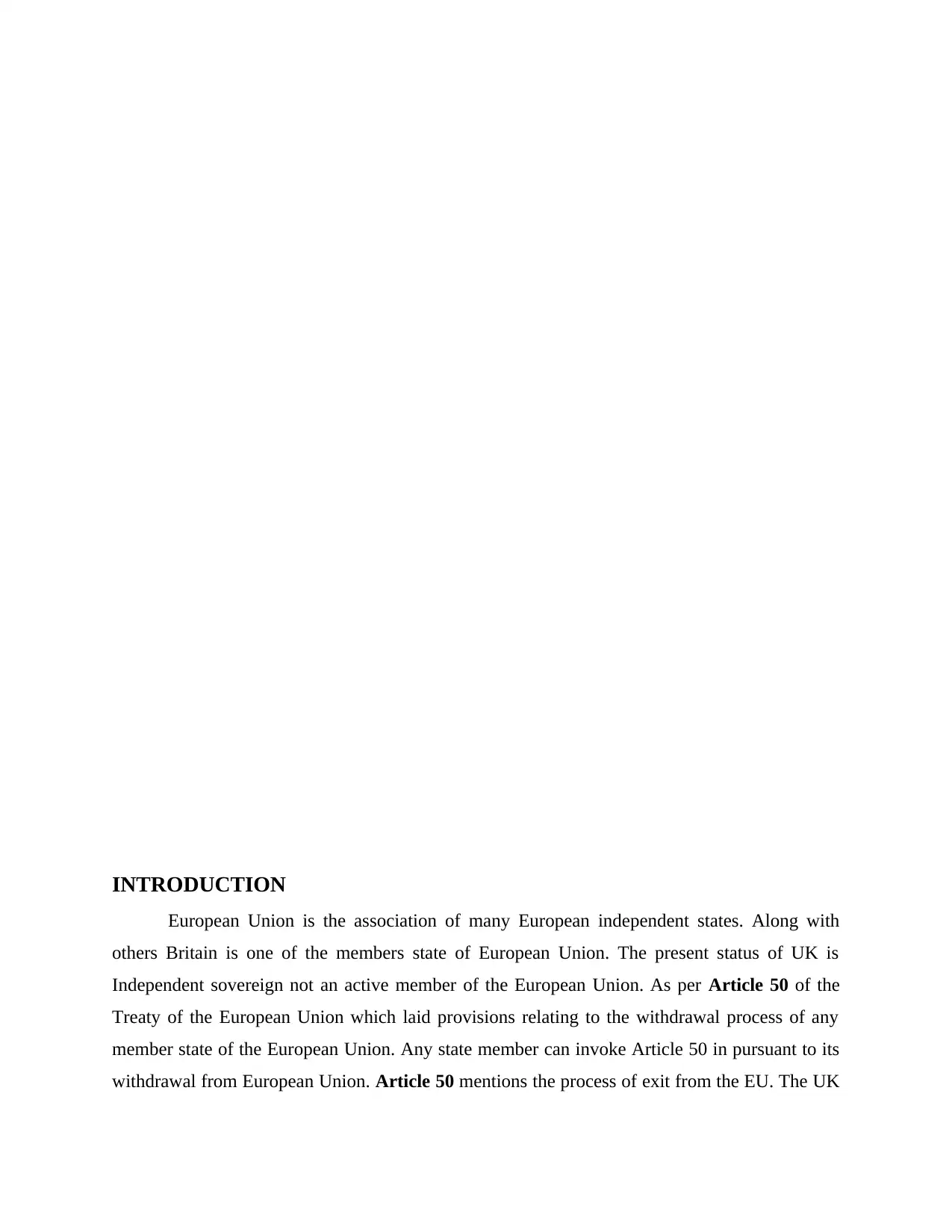
INTRODUCTION
European Union is the association of many European independent states. Along with
others Britain is one of the members state of European Union. The present status of UK is
Independent sovereign not an active member of the European Union. As per Article 50 of the
Treaty of the European Union which laid provisions relating to the withdrawal process of any
member state of the European Union. Any state member can invoke Article 50 in pursuant to its
withdrawal from European Union. Article 50 mentions the process of exit from the EU. The UK
European Union is the association of many European independent states. Along with
others Britain is one of the members state of European Union. The present status of UK is
Independent sovereign not an active member of the European Union. As per Article 50 of the
Treaty of the European Union which laid provisions relating to the withdrawal process of any
member state of the European Union. Any state member can invoke Article 50 in pursuant to its
withdrawal from European Union. Article 50 mentions the process of exit from the EU. The UK
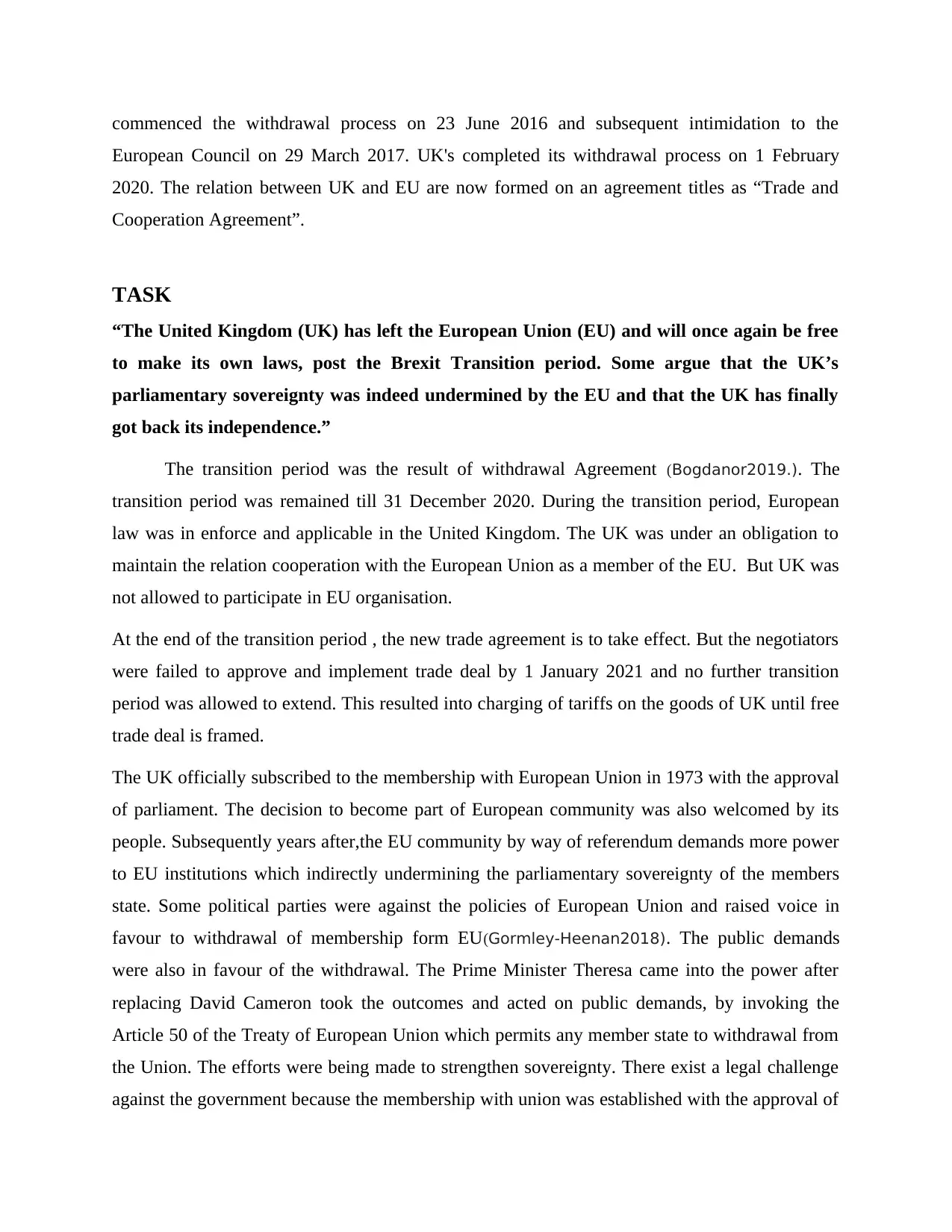
commenced the withdrawal process on 23 June 2016 and subsequent intimidation to the
European Council on 29 March 2017. UK's completed its withdrawal process on 1 February
2020. The relation between UK and EU are now formed on an agreement titles as “Trade and
Cooperation Agreement”.
TASK
“The United Kingdom (UK) has left the European Union (EU) and will once again be free
to make its own laws, post the Brexit Transition period. Some argue that the UK’s
parliamentary sovereignty was indeed undermined by the EU and that the UK has finally
got back its independence.”
The transition period was the result of withdrawal Agreement (Bogdanor2019.). The
transition period was remained till 31 December 2020. During the transition period, European
law was in enforce and applicable in the United Kingdom. The UK was under an obligation to
maintain the relation cooperation with the European Union as a member of the EU. But UK was
not allowed to participate in EU organisation.
At the end of the transition period , the new trade agreement is to take effect. But the negotiators
were failed to approve and implement trade deal by 1 January 2021 and no further transition
period was allowed to extend. This resulted into charging of tariffs on the goods of UK until free
trade deal is framed.
The UK officially subscribed to the membership with European Union in 1973 with the approval
of parliament. The decision to become part of European community was also welcomed by its
people. Subsequently years after,the EU community by way of referendum demands more power
to EU institutions which indirectly undermining the parliamentary sovereignty of the members
state. Some political parties were against the policies of European Union and raised voice in
favour to withdrawal of membership form EU(Gormley-Heenan2018). The public demands
were also in favour of the withdrawal. The Prime Minister Theresa came into the power after
replacing David Cameron took the outcomes and acted on public demands, by invoking the
Article 50 of the Treaty of European Union which permits any member state to withdrawal from
the Union. The efforts were being made to strengthen sovereignty. There exist a legal challenge
against the government because the membership with union was established with the approval of
European Council on 29 March 2017. UK's completed its withdrawal process on 1 February
2020. The relation between UK and EU are now formed on an agreement titles as “Trade and
Cooperation Agreement”.
TASK
“The United Kingdom (UK) has left the European Union (EU) and will once again be free
to make its own laws, post the Brexit Transition period. Some argue that the UK’s
parliamentary sovereignty was indeed undermined by the EU and that the UK has finally
got back its independence.”
The transition period was the result of withdrawal Agreement (Bogdanor2019.). The
transition period was remained till 31 December 2020. During the transition period, European
law was in enforce and applicable in the United Kingdom. The UK was under an obligation to
maintain the relation cooperation with the European Union as a member of the EU. But UK was
not allowed to participate in EU organisation.
At the end of the transition period , the new trade agreement is to take effect. But the negotiators
were failed to approve and implement trade deal by 1 January 2021 and no further transition
period was allowed to extend. This resulted into charging of tariffs on the goods of UK until free
trade deal is framed.
The UK officially subscribed to the membership with European Union in 1973 with the approval
of parliament. The decision to become part of European community was also welcomed by its
people. Subsequently years after,the EU community by way of referendum demands more power
to EU institutions which indirectly undermining the parliamentary sovereignty of the members
state. Some political parties were against the policies of European Union and raised voice in
favour to withdrawal of membership form EU(Gormley-Heenan2018). The public demands
were also in favour of the withdrawal. The Prime Minister Theresa came into the power after
replacing David Cameron took the outcomes and acted on public demands, by invoking the
Article 50 of the Treaty of European Union which permits any member state to withdrawal from
the Union. The efforts were being made to strengthen sovereignty. There exist a legal challenge
against the government because the membership with union was established with the approval of
Secure Best Marks with AI Grader
Need help grading? Try our AI Grader for instant feedback on your assignments.
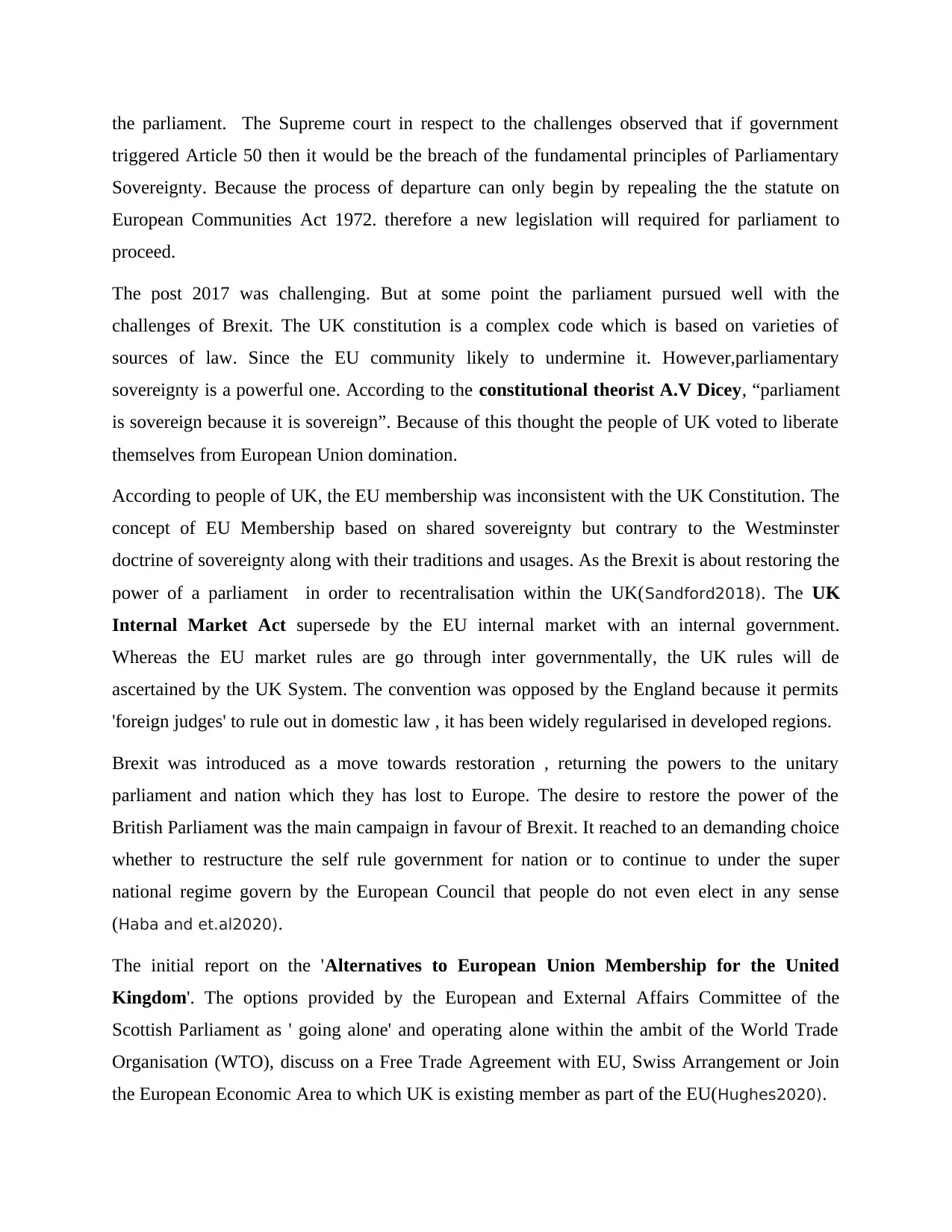
the parliament. The Supreme court in respect to the challenges observed that if government
triggered Article 50 then it would be the breach of the fundamental principles of Parliamentary
Sovereignty. Because the process of departure can only begin by repealing the the statute on
European Communities Act 1972. therefore a new legislation will required for parliament to
proceed.
The post 2017 was challenging. But at some point the parliament pursued well with the
challenges of Brexit. The UK constitution is a complex code which is based on varieties of
sources of law. Since the EU community likely to undermine it. However,parliamentary
sovereignty is a powerful one. According to the constitutional theorist A.V Dicey, “parliament
is sovereign because it is sovereign”. Because of this thought the people of UK voted to liberate
themselves from European Union domination.
According to people of UK, the EU membership was inconsistent with the UK Constitution. The
concept of EU Membership based on shared sovereignty but contrary to the Westminster
doctrine of sovereignty along with their traditions and usages. As the Brexit is about restoring the
power of a parliament in order to recentralisation within the UK(Sandford2018). The UK
Internal Market Act supersede by the EU internal market with an internal government.
Whereas the EU market rules are go through inter governmentally, the UK rules will de
ascertained by the UK System. The convention was opposed by the England because it permits
'foreign judges' to rule out in domestic law , it has been widely regularised in developed regions.
Brexit was introduced as a move towards restoration , returning the powers to the unitary
parliament and nation which they has lost to Europe. The desire to restore the power of the
British Parliament was the main campaign in favour of Brexit. It reached to an demanding choice
whether to restructure the self rule government for nation or to continue to under the super
national regime govern by the European Council that people do not even elect in any sense
(Haba and et.al2020).
The initial report on the 'Alternatives to European Union Membership for the United
Kingdom'. The options provided by the European and External Affairs Committee of the
Scottish Parliament as ' going alone' and operating alone within the ambit of the World Trade
Organisation (WTO), discuss on a Free Trade Agreement with EU, Swiss Arrangement or Join
the European Economic Area to which UK is existing member as part of the EU(Hughes2020).
triggered Article 50 then it would be the breach of the fundamental principles of Parliamentary
Sovereignty. Because the process of departure can only begin by repealing the the statute on
European Communities Act 1972. therefore a new legislation will required for parliament to
proceed.
The post 2017 was challenging. But at some point the parliament pursued well with the
challenges of Brexit. The UK constitution is a complex code which is based on varieties of
sources of law. Since the EU community likely to undermine it. However,parliamentary
sovereignty is a powerful one. According to the constitutional theorist A.V Dicey, “parliament
is sovereign because it is sovereign”. Because of this thought the people of UK voted to liberate
themselves from European Union domination.
According to people of UK, the EU membership was inconsistent with the UK Constitution. The
concept of EU Membership based on shared sovereignty but contrary to the Westminster
doctrine of sovereignty along with their traditions and usages. As the Brexit is about restoring the
power of a parliament in order to recentralisation within the UK(Sandford2018). The UK
Internal Market Act supersede by the EU internal market with an internal government.
Whereas the EU market rules are go through inter governmentally, the UK rules will de
ascertained by the UK System. The convention was opposed by the England because it permits
'foreign judges' to rule out in domestic law , it has been widely regularised in developed regions.
Brexit was introduced as a move towards restoration , returning the powers to the unitary
parliament and nation which they has lost to Europe. The desire to restore the power of the
British Parliament was the main campaign in favour of Brexit. It reached to an demanding choice
whether to restructure the self rule government for nation or to continue to under the super
national regime govern by the European Council that people do not even elect in any sense
(Haba and et.al2020).
The initial report on the 'Alternatives to European Union Membership for the United
Kingdom'. The options provided by the European and External Affairs Committee of the
Scottish Parliament as ' going alone' and operating alone within the ambit of the World Trade
Organisation (WTO), discuss on a Free Trade Agreement with EU, Swiss Arrangement or Join
the European Economic Area to which UK is existing member as part of the EU(Hughes2020).
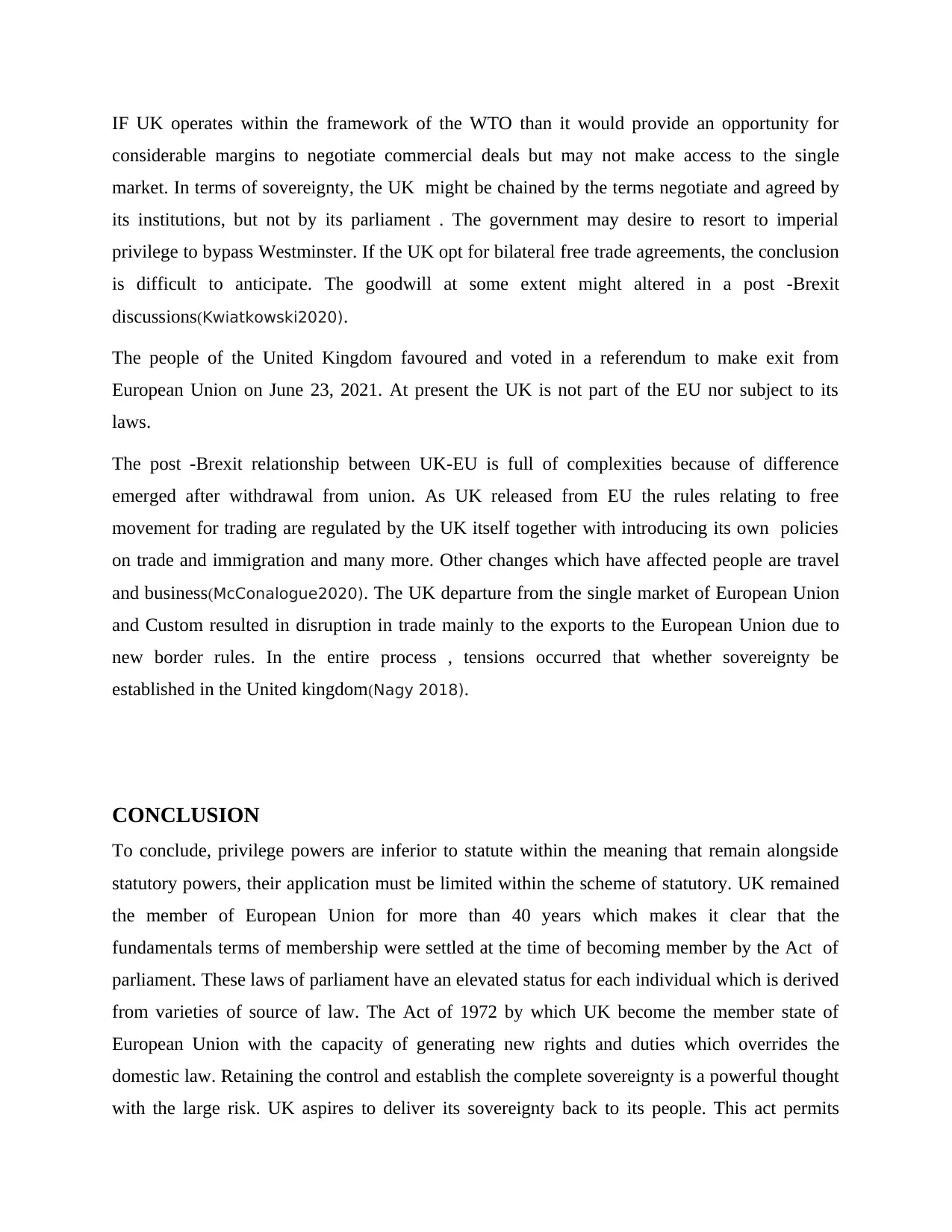
IF UK operates within the framework of the WTO than it would provide an opportunity for
considerable margins to negotiate commercial deals but may not make access to the single
market. In terms of sovereignty, the UK might be chained by the terms negotiate and agreed by
its institutions, but not by its parliament . The government may desire to resort to imperial
privilege to bypass Westminster. If the UK opt for bilateral free trade agreements, the conclusion
is difficult to anticipate. The goodwill at some extent might altered in a post -Brexit
discussions(Kwiatkowski2020).
The people of the United Kingdom favoured and voted in a referendum to make exit from
European Union on June 23, 2021. At present the UK is not part of the EU nor subject to its
laws.
The post -Brexit relationship between UK-EU is full of complexities because of difference
emerged after withdrawal from union. As UK released from EU the rules relating to free
movement for trading are regulated by the UK itself together with introducing its own policies
on trade and immigration and many more. Other changes which have affected people are travel
and business(McConalogue2020). The UK departure from the single market of European Union
and Custom resulted in disruption in trade mainly to the exports to the European Union due to
new border rules. In the entire process , tensions occurred that whether sovereignty be
established in the United kingdom(Nagy 2018).
CONCLUSION
To conclude, privilege powers are inferior to statute within the meaning that remain alongside
statutory powers, their application must be limited within the scheme of statutory. UK remained
the member of European Union for more than 40 years which makes it clear that the
fundamentals terms of membership were settled at the time of becoming member by the Act of
parliament. These laws of parliament have an elevated status for each individual which is derived
from varieties of source of law. The Act of 1972 by which UK become the member state of
European Union with the capacity of generating new rights and duties which overrides the
domestic law. Retaining the control and establish the complete sovereignty is a powerful thought
with the large risk. UK aspires to deliver its sovereignty back to its people. This act permits
considerable margins to negotiate commercial deals but may not make access to the single
market. In terms of sovereignty, the UK might be chained by the terms negotiate and agreed by
its institutions, but not by its parliament . The government may desire to resort to imperial
privilege to bypass Westminster. If the UK opt for bilateral free trade agreements, the conclusion
is difficult to anticipate. The goodwill at some extent might altered in a post -Brexit
discussions(Kwiatkowski2020).
The people of the United Kingdom favoured and voted in a referendum to make exit from
European Union on June 23, 2021. At present the UK is not part of the EU nor subject to its
laws.
The post -Brexit relationship between UK-EU is full of complexities because of difference
emerged after withdrawal from union. As UK released from EU the rules relating to free
movement for trading are regulated by the UK itself together with introducing its own policies
on trade and immigration and many more. Other changes which have affected people are travel
and business(McConalogue2020). The UK departure from the single market of European Union
and Custom resulted in disruption in trade mainly to the exports to the European Union due to
new border rules. In the entire process , tensions occurred that whether sovereignty be
established in the United kingdom(Nagy 2018).
CONCLUSION
To conclude, privilege powers are inferior to statute within the meaning that remain alongside
statutory powers, their application must be limited within the scheme of statutory. UK remained
the member of European Union for more than 40 years which makes it clear that the
fundamentals terms of membership were settled at the time of becoming member by the Act of
parliament. These laws of parliament have an elevated status for each individual which is derived
from varieties of source of law. The Act of 1972 by which UK become the member state of
European Union with the capacity of generating new rights and duties which overrides the
domestic law. Retaining the control and establish the complete sovereignty is a powerful thought
with the large risk. UK aspires to deliver its sovereignty back to its people. This act permits

definite degree of devolution to be acknowledged , upon several negotiation and discussion to
local government and cities enabling them to set rules and regulations within the nation.
Parliament is the supreme legal authority to decide the affairs of its nation and when it legislate
for the interest of its people it must make wit resolute firmness.
local government and cities enabling them to set rules and regulations within the nation.
Parliament is the supreme legal authority to decide the affairs of its nation and when it legislate
for the interest of its people it must make wit resolute firmness.
Paraphrase This Document
Need a fresh take? Get an instant paraphrase of this document with our AI Paraphraser
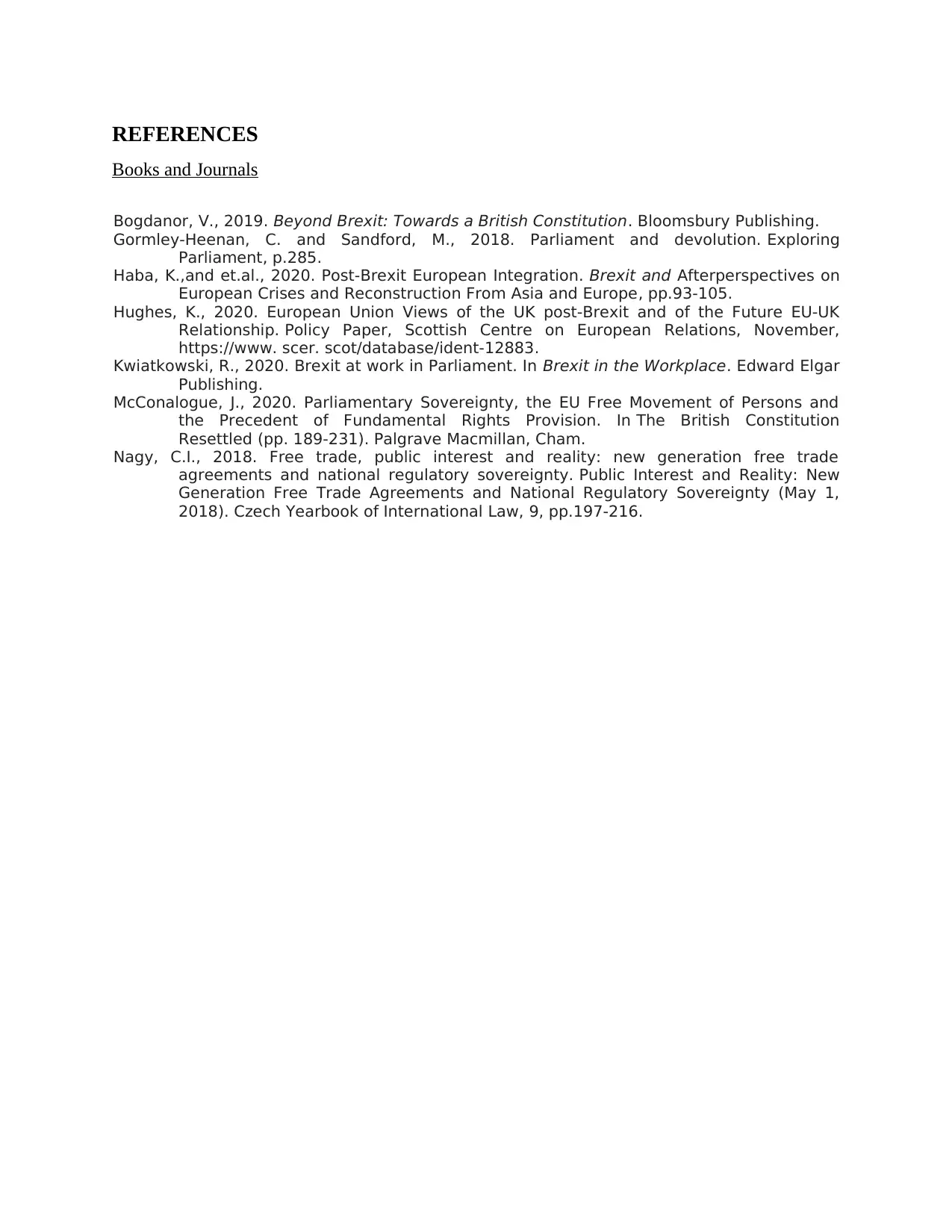
REFERENCES
Books and Journals
Bogdanor, V., 2019. Beyond Brexit: Towards a British Constitution. Bloomsbury Publishing.
Gormley-Heenan, C. and Sandford, M., 2018. Parliament and devolution. Exploring
Parliament, p.285.
Haba, K.,and et.al., 2020. Post-Brexit European Integration. Brexit and Afterperspectives on
European Crises and Reconstruction From Asia and Europe, pp.93-105.
Hughes, K., 2020. European Union Views of the UK post-Brexit and of the Future EU-UK
Relationship. Policy Paper, Scottish Centre on European Relations, November,
https://www. scer. scot/database/ident-12883.
Kwiatkowski, R., 2020. Brexit at work in Parliament. In Brexit in the Workplace. Edward Elgar
Publishing.
McConalogue, J., 2020. Parliamentary Sovereignty, the EU Free Movement of Persons and
the Precedent of Fundamental Rights Provision. In The British Constitution
Resettled (pp. 189-231). Palgrave Macmillan, Cham.
Nagy, C.I., 2018. Free trade, public interest and reality: new generation free trade
agreements and national regulatory sovereignty. Public Interest and Reality: New
Generation Free Trade Agreements and National Regulatory Sovereignty (May 1,
2018). Czech Yearbook of International Law, 9, pp.197-216.
Books and Journals
Bogdanor, V., 2019. Beyond Brexit: Towards a British Constitution. Bloomsbury Publishing.
Gormley-Heenan, C. and Sandford, M., 2018. Parliament and devolution. Exploring
Parliament, p.285.
Haba, K.,and et.al., 2020. Post-Brexit European Integration. Brexit and Afterperspectives on
European Crises and Reconstruction From Asia and Europe, pp.93-105.
Hughes, K., 2020. European Union Views of the UK post-Brexit and of the Future EU-UK
Relationship. Policy Paper, Scottish Centre on European Relations, November,
https://www. scer. scot/database/ident-12883.
Kwiatkowski, R., 2020. Brexit at work in Parliament. In Brexit in the Workplace. Edward Elgar
Publishing.
McConalogue, J., 2020. Parliamentary Sovereignty, the EU Free Movement of Persons and
the Precedent of Fundamental Rights Provision. In The British Constitution
Resettled (pp. 189-231). Palgrave Macmillan, Cham.
Nagy, C.I., 2018. Free trade, public interest and reality: new generation free trade
agreements and national regulatory sovereignty. Public Interest and Reality: New
Generation Free Trade Agreements and National Regulatory Sovereignty (May 1,
2018). Czech Yearbook of International Law, 9, pp.197-216.
1 out of 8
Related Documents
Your All-in-One AI-Powered Toolkit for Academic Success.
+13062052269
info@desklib.com
Available 24*7 on WhatsApp / Email
![[object Object]](/_next/static/media/star-bottom.7253800d.svg)
Unlock your academic potential
© 2024 | Zucol Services PVT LTD | All rights reserved.




